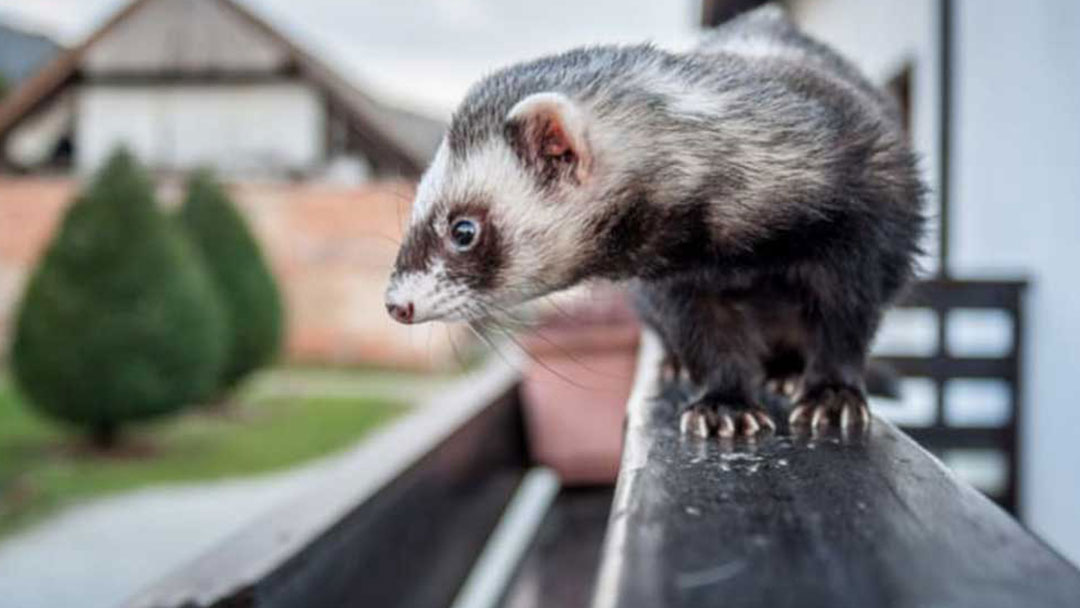
Housing Pet Ferrets
Ferrets make wonderful pets, provided you have the time and patience to care for them properly. They love company and are quite mischievous little creatures.
Bins, lounge chairs, drawers, toilet bowls, behind fridges and washing machines, in cupboards, and air ducts are all likely places that a ferret will find, so, firstly, you will need to ferret-proof these to stop your ferret escaping or being injured.
Part or all of your yard can also be ferret-proofed to allow access to outdoors - ferrets love to run through grass and dig in soil or sand. Fences need to be buried 2 feet in the ground, and made of a material which cannot be climbed. Keep shrubs and climbers away from the fences. Low-growing plants and even a pond can provide a lifetime of enjoyment. Ferret-proofing an area you will also frequent means you can enjoy the area together.
Where will my ferret live?
Ferrets aren't suitable cage animals - they are as active (or more so) as dogs and cats so need to be given a similar sized area to live in. Ferret-proofing as much of your home and/or garden as possible, will provide a living area which will promote good physical and mental health. A decent-sized room should be considered a minimum, so they can run & play at any time of day.
Door barriers made from perspex or plywood can be used to keep ferrets in or out of certain rooms, while still allowing you easy access. If keeping exits such as the front or back door closed is difficult, they can live in several rooms away from these exits with a door barrier to stop them escaping. Access to the ferret-proofed yard or area can be provided through a cat flap or open window.
Ferrets are very curious and will wander if they escape from your property, so properly ferret-proofing is one of the most important aspects of ferret care.
Can I keep more than one ferret together?
Ferrets are very sociable animals and are happiest when they have company, especially young ferrets. Most ferrets will be desexed, so they can live together, however any ferrets which are not desexed should be kept separate.
What sort of bedding should I use?
Ferrets love having a dark, cosy spot to sleep and this is important for their health and wellbeing. Plastic or wooden crates, or even cardboard boxes, make great sleeping boxes with an entrance hole cut in the side. Towels can be used as bedding, or old clothes and blankets. Wood shavings and sawdust are not recommended.
What else do they need?
As well as the sleeping box, heavy ceramic bowls that cannot be tipped over are recommended for food and water. Water bottles are not recommended as they can become blocked.
A litter tray should be placed in a corner of each room they have access to for urination and defecation and cleaned regularly. Most ferrets can be trained to use the litter tray with praise and rewards. Clay and silicon based cat litters can cause problems, as ferrets drag their behinds after using the litter tray. Newspaper sheets, or recycled paper litters are both excellent.
Toys are also essential and many special ferret toys are available. Avoid rubber toys that can be easily chewed into pieces and swallowed. Hard plastic toys, ping pong balls, golf balls, cardboard tubes are suitable, and flexible pipes available from hardware stores are excellent as tunnels.
What about heat stroke?
Ferrets are very susceptible to heat stroke at temperatures above the mid-to-high 20's. It is critical to keep their environmental temperature at a comfortable level. Fans and breezes do not cool ferrets as they cannot sweat or pant (the cooling effect we feel is from evaporation of sweat).
Remember to check the actual temperature as an area can feel cool to us, but be too hot for a ferret.
Does my ferret need exercise?
Ferrets are active for periods throughout the day and night, so providing a large ferret-proofed living area (inside, outside or both) where they can run & play whenever they choose will keep them fit and healthy. If kept in cages, ferrets can become depressed or unsociable, and difficult to handle, just as a dog or cat would. You can also walk your pet ferret using a harness and lead but beware of aggressive dogs, and birds like magpies.
Ferrets and the law
Please note that ferrets are banned as pets in Queensland and the Northern Territory. In the ACT you need a licence to keep ferrets. Further information is available from animal control/environmental staff at your local government office, or from your local ferret society.